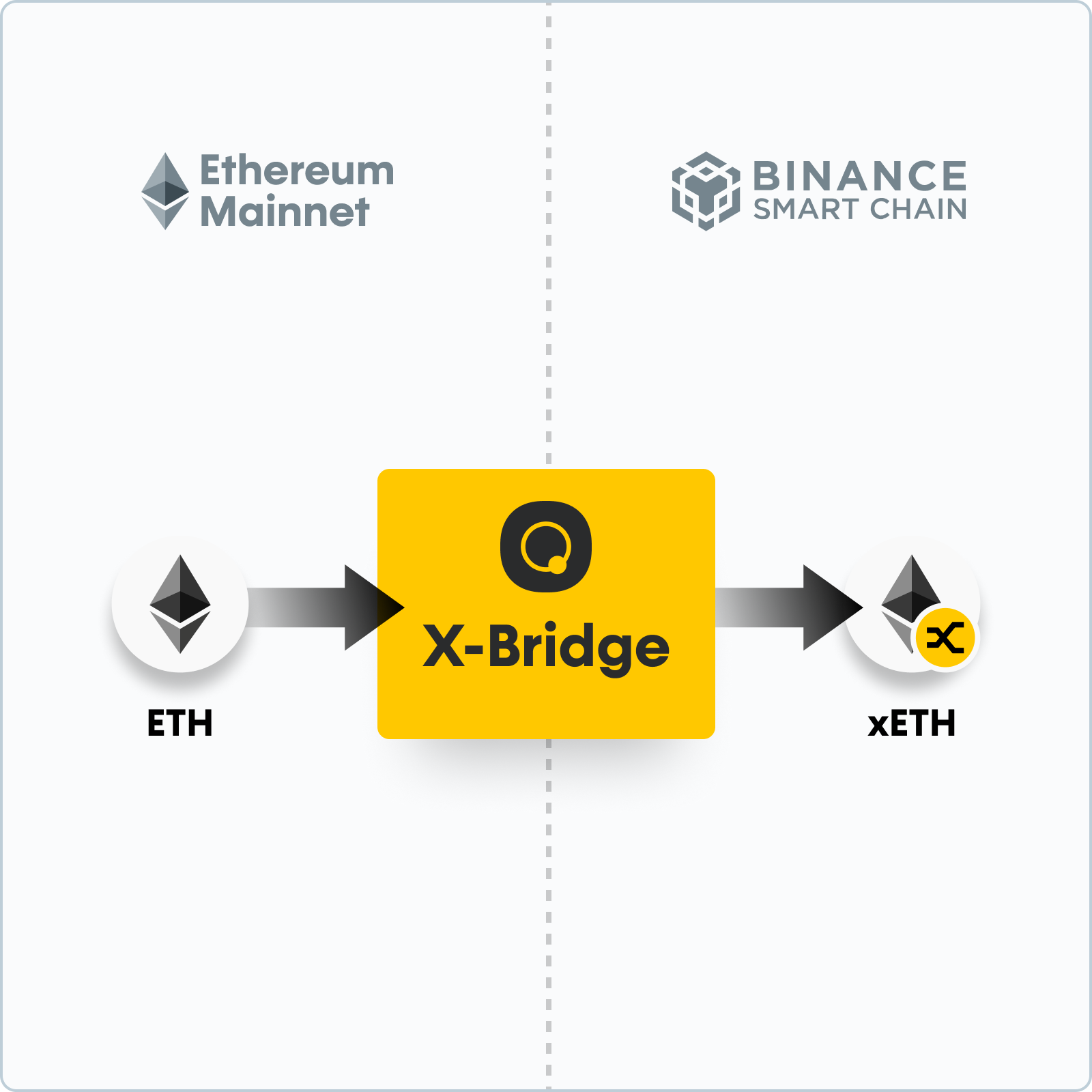Bridge

X-Collateral is the cross-chain feature that enables users to collateralize their assets on other networks without moving assets from one chain to another.
- Even users with ETH on ethereum can take advantage of dual efficiencies of speed and low gas fee of Binance Smart Chain network.
- Ultimately, tokens on various networks can be used as collateral while taking advantage of the speed and low fees of BSC. Ethereum is the first network that is supported on X-Collateral so individual investors do not need to suffer from high ETH gas fees.
- Interest-bearing tokens will be supported soon
Users do not need to stop collecting interest when providing liquidity to the market anymore. Interest-bearing tokens such as aWETH and cETH are planned to be used as collateral. Thus, users can enjoy the cross-chain experience (low-fee, fast network of BSC) while collecting interests using their interest-bearing tokens.
Suppose a user wants to collateralize 1 ETH on Ethereum Network. First of all, the user transfers 1 ETH to smart contracts of Qubit on Ethereum. Just like other transactions on the Ethereum network, this takes time to be completed and can be tracked on etherscan.com. Users can borrow 0.05 BNB from Qubit for future transactions such as borrowing against collateralized xETH. If the transaction is successful, 1 ETH is now securely protected by the smart contract and not required to be burned or moved out from Ethereum. Lastly, Qubit protocol mints 1 xETH on BSC network and transfers it to the user. The gas fee incurred will be covered by Qubit. The newly minted token (1 xETH) can be used to interact with protocols on the BSC network, mainly Qubit for now. The user can use 1 xETH as collateral to borrow.
The key difference between ETH(BEP-20) and xETH is whether you burn your ETH on Ethereum network or not. Suppose you want to use 1 ETH on Ethereum without using X-Collateral. The 1 ETH will be burned and you will get ETH(BEP-20) on Binance Smart Chain. This feature is usually called ‘Bridge’. In the end you no longer possess ETH on the main Ethereum network. Contrarily, if you use X-CollateraI, your ETH is locked in smart contracts on Ethereum network and mint xETH on Binance Smart Chain instead being burned. Thus, you still own your ETH on the mainnet.
ETH | ETH(BEP-20) | xETH | |
|---|---|---|---|
Network | Ethereum | Binance Smart Chain | Binance Smart Chain |
How to get | PoW Mining | Burn ETH and mint BEP-20 token | Keep ETH and mint BEP-20 token |
Cross-chain liquidation follows the same logic as non-cross-chain liquidations. Collateralized xETH will be liquidated and users will get remaining xETH which can be used to redeem ETH or collateralize and borrow.
There will be no separate protocol fee. Users will only pay for the gas fees charged by the networks when a transaction is made. This includes the withdrawal fee (0.015~0.018 ETH) which is used to pay for the gas fees on the Ethereum network.
Yes, the whole X-Collateral feature (including contracts and scripts) has been audited by Theori, a professional auditing firm. The audit result is published here. (https://github.com/PancakeBunny-finance/qubit-finance/blob/master/audits/mound_qubit_xChain_audit_rev1.1.pdf)
X-Tokens are liquid and tokenized representations of assets collateralized via X-Collateral. For example, xETH allows users to gain liquidity on BSC using their ETH, enabling the value in ETH to be utilized in DeFi applications such as Qubit.
The value of xETH equals ETH because users can always redeem xETH to ETH on Qubit. The xETH token is also a BEP20 token which means users can transfer it to any other wallet on the Binance Smart Chain.
Yes, however in future other networks will be supported and you may find more information on our Roadmap(link)
At the moment, yes. Interest-bearing tokens such as aETH (AAVE ETH), cETH (Curve ETH) will be supported soon.
Last modified 1yr ago